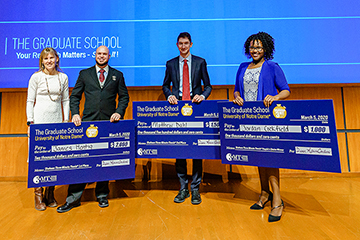James Hentig, a Ph.D. student from the Department of Biological Sciences, won the 2020 Notre Dame Graduate School Shaheen Three Minute Thesis Competition (3MT®) on Thursday, March 5 on the stage in Jordan Auditorium in the Mendoza College of Business.

The Shaheen 3MT® is a communication competition where all graduate students from the Colleges of Engineering, Science, and Arts & Letters as well as the Keough School of Global Affairs, try to effectively explain their research in a language appropriate to an audience of specialists and non-specialists alike, in three minutes or less. Competitors addressed a panel of judges in front of a live audience using a single static slide to support their presentation.
Hentig, whose faculty adviser is Professor David Hyde, was the eighth of nine competitors to present bested the other finalists for a top prize of $2000. A second place prize of $1500 went to Matthew Dahl (POLS) and $1000 to the People’s Choice winner, Jordan Cockfield (BIOS).
Other finalists who competed in the event were Gozde Basara (AME), Brandon Hollihan (DMA), Jeya Pradha Jeyaraj (EE), Sam Potier (PHYS), Leanne Tang (ESTM) and Julaine Zenk (PSY).
Hentig’s presentation, titled “From Patient to Ph.D.: A Little Fish Helping Answer Big Questions,” tells of the facts of how traumatic brain injuries affect 60 million people around the world every year and have devastating affects contributing to other neurodegenerative disorders like Alzheimer's, Parkinson's, and Dementia. He explains how research in this area has predominately been done in the rodent, an expensive model organism, without the ability to regenerate, limiting us to examining only the effects of the injury. During Hentig’s research he goes on to explain how he has developed a new cost-effective, rapid, and simplistic brain injury model applied to the adult zebrafish, who have amazing regenerative capabilities throughout their entire life. The research conducted is more of a blunt force trauma approach, similar to the human experience.
Starting off with his personal testimony of his traumatic brain injury he acquired while serving our country in the United States Army as an Airborne Combat Medic in Afghanistan, Hentig shows how this research is personal. He explains how his dissertation has been centered around the development and characterization of this injury model, describing the injury following a mild, moderate, or severe injury and how the zebrafish injuries recreate human disease. He is further examining the gene regulation that leads to the regeneration and recovery we see in zebrafish, allowing for the replacement of lost and damaged neurons following a traumatic brain injury.
Originally published by Dawn Rizek at Home 1 on March 11, 2020.